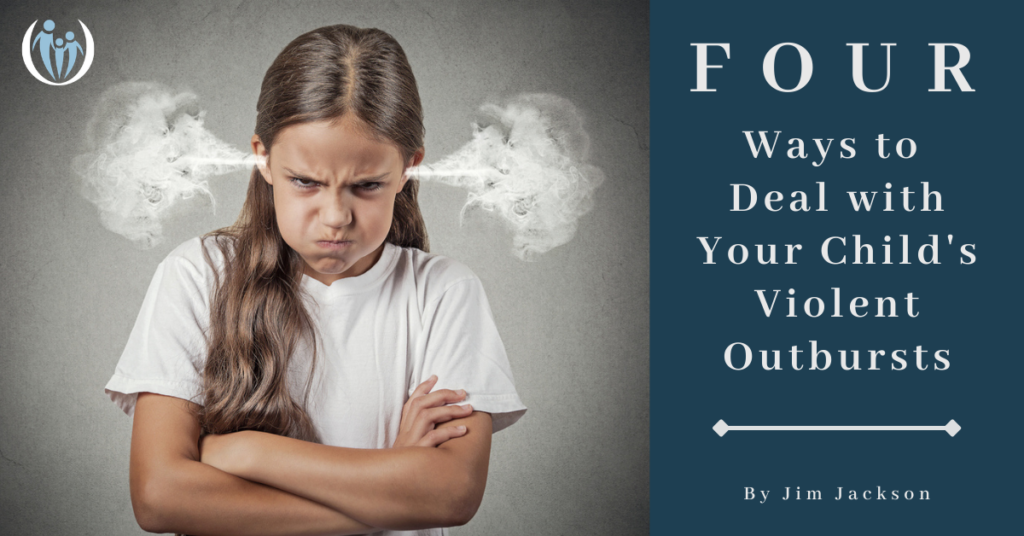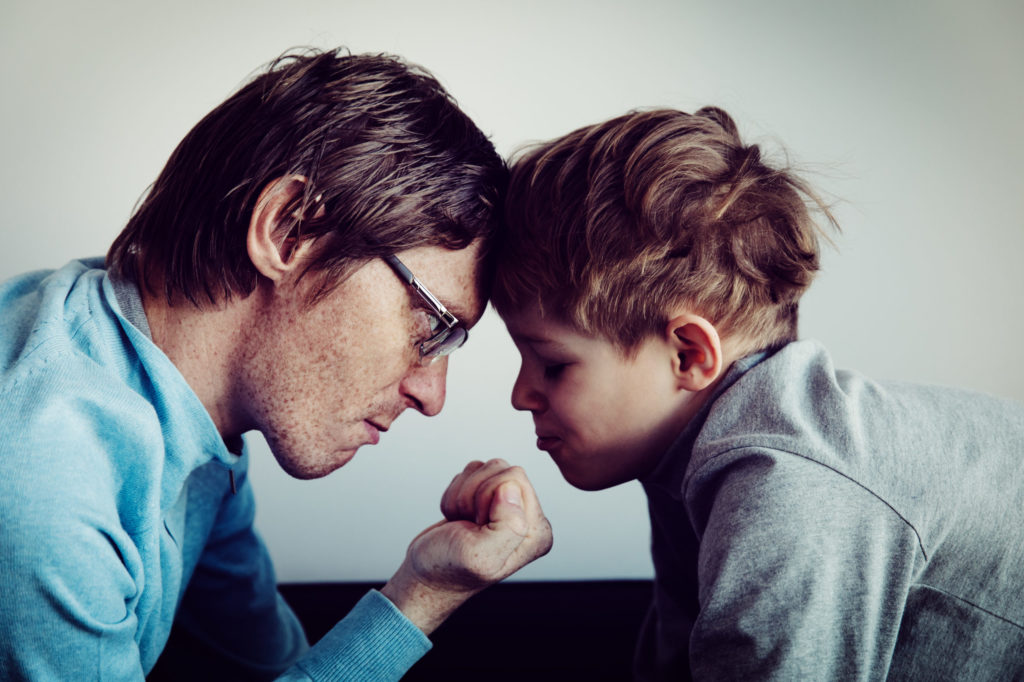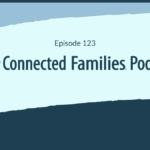
4 Ways to Deal with Your Child’s Violent Outbursts

Kids of all ages can be prone to violent outbursts. Sometimes these violent outbursts get out of control. When your child screams, hits, bites, or kicks it can leave you feeling overwhelmed and discouraged. Your tendency, when this happens, might be to rise up and meet their energy with your own big energy in order to make your child’s violent outburst stop. And, to be quite honest, it must stop for the family to be a safe place for everyone.
The problem is that efforts to “Stop it now!” usually have one of two outcomes:
- It can escalate the whole situation to rage-filled chaos.
OR
- If you “succeed,” you may sweep the confusion, rage, shame, or exasperation “under the rug” only to have it rear its head again the next time the pressure is on.
Note: If your kids are already violent, to the degree that they regularly break things or harm themselves or others, you may need additional help. In addition to reading this post for practical ideas to get you started, we would recommend you seek professional help from a Christian Therapist.
When we coach parents, we frequently hear, “What should I do when my child has a violent outburst?” Read on to learn more about why kids have these outbursts, what to do in the moment, and how we, as parents, can be proactive in stopping outbursts before they begin.
Why do kids have violent outbursts?
Kids can get violent sometimes. Scary violent. Maybe throw things. Or hit, scratch, or even bite their siblings and parents. It’s tempting to think you’re “raising a monster” and be filled with fear. But fear not. It can be normal for kids’ rage to spiral out of control. Through our years of experience, we’ve learned a process that can help rage-filled children learn to manage their emotions and make more constructive choices.
Today’s publicized violence makes it extra difficult for parents to help their kids learn to navigate life’s tensions and turmoil wisely. There is violence on TV and in video games. In recent years it seems the normal response to conflict on social media is some form of violence.
It’s no surprise that in this hyper-violent environment, kids are more anxious than ever. Because of that underlying anxiety, more of them are acting out violently.
The truth is: every explosive outburst is generated by a mix of anger, anxiety, and feeling misunderstood or invalidated.
But take heart in another truth: God is every bit as present during these outbursts as at Sunday School. King David may have said it best: “When my heart was grieved, and my spirit embittered, I was senseless and ignorant; I was a brute beast before you. Yet I am always with you; you hold me by my right hand.
Limited ability to communicate or understand
During the moment when kids are experiencing these big emotions, they have a limited ability to communicate or understand anything at all, much less a sense of God’s presence. And you know what? The same is true of parents! This combination creates a volatile time bomb that compels both kids and grownups alike to do pretty drastic things to be heard.
But it doesn’t have to be this way. We’ve seen great results in families when parents learn some new ways to engage their kids during these volatile episodes, ways that make it possible to regain calmness and even a sense of God’s presence and purposes in the midst of the chaos.
What hostage negotiators can teach parents
To help parents better handle violence if it emerges, the process taught by the FBI’s hostage negotiation procedure and the world-famous CPS approach developed by Dr. Ross Greene is quite similar to the process we teach parents for navigating violent outbursts. Both of these carefully researched approaches emphasize the importance of addressing explosive people with an open posture of empathy and listening. Kids who are having a violent outburst first and foremost need to be understood. Only then can they be effectively guided.
When parents ask, “What should I do when my child has a violent outburst?” Our quick answer is to work the Earned Respect Process: Stay calm > Connect > Coach to Solve > Celebrate ANY progress => Earn respect.
Wait. Another step-by-step process to try and follow for parenting? You may even feel like you’ve already tried everything out there. The truth is, once you learn the process it’s actually not that hard. Based on my experience working with hundreds of at-risk youth, I’ve utilized this process countless times and seen success. Keep reading for a scenario that may imitate your life.
What does this look like in real life?
[As you read this, you may be thinking, “My child wouldn’t respond that way if I did or said those things.” We understand. These scenes can often be unpredictable. The goal here is not to give a script to follow but to share with you my thinking about how to earn respect when kids get or threaten to get, violent.]
It’s been a long hard day for both of you. Your child was working hard at school all day and sick of it. You’re exhausted from managing all your responsibilities too. Your efforts to manage both your work and her school were too much. You’re done for the day and just want to push the easy button and have someone else make dinner.
You walk past your daughter’s room on the way to the fridge. You see her perched on her bed with her device in hand, but you don’t want to deal with anything other than grabbing a snack. When you enter the kitchen, you see your child’s homework spread all over the table and onto the floor. You catch yourself. No more shouting. There have been too many meltdowns lately. But you know there needs to be accountability, so your voice is firm as you call your child in to clean up the mess. And that’s when it starts. Again.
“Honey! You need to get in here and clean up this mess before dinner!”
Nothing.
“Honey!” Your voice grows sterner. (You do this because you believe your child should respect you at times like this. You are growing frustrated.)
Nothing.
When your child responds to your respect with disrespect
You walk back to her room and stand in the doorway. Her position on the bed has not changed. It seems like her device is the most important relationship in her life. Because of the past history of what happens when you hold her accountable, you’re tempted to just leave her alone. But before you get a chance to think it through, without looking up, she angrily blurts out, “I hate this! All you ever do is nag.” Her energy catches you unprepared. You thought you were being gentle. At least more gentle than usual. Apparently, she thought otherwise.
You’ve been working hard at changing your approach, but it’s hard to remember how to respond when you’re feeling attacked. You remember to take a deep breath, slow down, and step back. No need to rush this. But your daughter didn’t take the parenting class or read the parenting tips you’ve read…and she continues to get even louder. “You never give up until you get your way! You always single me out! But this time, I’m getting MY WAY! Leave me alone!” She tries to shove you out of the room, but you stand firm.
This is NOT the time to demand respect, but to earn it.
The violence has begun
You can see your daughter’s whole body tense up. You feel yours tense up too. She’s looking around the room for stuff to punch or throw. It’s the moment of truth, that moment when almost any response is sure to escalate the situation further. What you do next will either cause you to lose respect or earn respect.
Remember: any fast, large, and/or loud expression from you will likely feel like an attack and push the child toward more violence.

At this moment, you implement the things you’ve learned, the basic steps for mitigating the violence:
- You take another deep breath to calm yourself – to let go of the stress and tension.
- You relax your posture and take a step back.
- Your heart rate slows.
- You feel your body settle just a bit, and your fingers no longer tingle.
- Your attitude softens.
Now, having stepped into the middle of numerous violent frays, I recognize that sometimes (though not nearly as often as we might think), it is necessary to act quickly in order to protect people and things. There just isn’t time to take a breath and step back. Just remember: that any fast, large, and/or loud expression from you will likely feel like an attack and push the child toward more violence. So keep it quick and do your best to get back to the main goal of earning respect. It might look something like this:
Engage LOUDLY (but not angrily), “Whoa! Whoa! Whoa!” Each word is a little softer and slower. Then calmly but firmly say: “Let’s breathe here for a minute.” Meeting their energy and then modeling bringing your energy down gently sets an example for your child to de-escalate with you; to see that even though you can be strong, you can be gentle too. And in this moment, a gentle approach will gain you respect. It will also help you keep the process moving.
Prefer to Listen?
For more ideas surrounding stopping violence in the moment, we recommend listening to our podcast, “Help! My Child is Violent!”
Old goal vs. New goal
As your goal for the interaction changes, your daughter senses a difference, and her energy deflates just a bit. (You like the new you!) Your efforts buy you some time to implement the process you’ve been learning and remember your new goal. You are earning respect! Not the kind that gets what it wants just because you say so (which is not really respect at all) but the kind that builds trust and wisdom in your kids through all life’s challenges.
Old goal: Demand respect and obedience.
New goal: Earn real respect using the Earned Respect Process.
- Calm
- Connect
- Coach (to Solve)
- Celebrate (ANY progress)
The result? Earned respect.
Note: If your child’s violent outburst continues (in spite of your best efforts) to progress toward truly dangerous violence, do what you must do to stop it. Then when things settle down, enlist professional help from a Connected Families Coach, a local therapist, or a school psychologist.
What does my child need during a violent outburst?
While it might seem counterintuitive, this process is ALL ABOUT what your child needs. There is no focus (just yet) on what you said or are expecting. No focus (just yet) on your thoughts and feelings. If a child is to feel supported through difficult challenges, they must know that you are FOR them. Not against them. Any attempt you make in the heat of the moment to take care of your needs will be perceived as “against them.” You will lose respect – even if your kids comply.
4 proactive things you can do once the violence has subsided
In the story above, you’ve already started the process. Let’s follow through with the other steps of the Earned Respect Process and see where it takes us:
Calm
1. You calmed down. You even stepped back, sensing that your child might need some space. Or you may have decided to step toward your child to offer a loving presence. In your calmness, you chose well. Your child seemed to calm a bit too. Respect is almost always earned in calm spaces. She began to feel safer in your presence. Only when your child perceives you as safe can you effectively Connect and Coach.

Connect
2. Now it’s time to Connect. To Connect is to communicate the message “You are loved no matter what!” It may be as simple as making an empathetic or understanding statement, “You must be really tired of my nagging!” Just a short statement or two that lets your child know you get what it’s like to be them. Just say it. And let it hang. No need to explain or justify yourself right now.
The child may say more, or they may not. If not, ask, “Need a snack?” or, “How can I help you right now?” When kids know you are FOR them and that you’ll take time to work at understanding them, they are far more willing to engage with a problem to solve it. You may even offer a hug or a little back rub. The respect meter is rising!
Coach to Solve
3. Coach to Solve is about helping your child develop brain pathways to build skills and habits for more constructive outcomes. To open their brain means giving the child more ownership of the conversation so you are better able to set some clear expectations for the future.
Most parents are accustomed to telling their kids what will happen. This rarely earns respect and usually loses some. And it trains kids to depend on what we tell them rather than develop wisdom for themselves. If your child is used to you telling and not asking, start with simple “Yes” or “No” questions. This is usually all an upset child can process.
The first question to ask
A great starting point for situations like this is, “Do you want to solve this now or wait for a bit?” This question invites the thinking part of the child’s brain to do a little work, and there’s not a right or wrong answer – just the answer they pick. The question also lets the child know that there is some accountability to solve.
Your child will likely want to wait, so get her that snack (more connection!) and invite her to set a time in the near future (2 minutes? 5 minutes? 10 minutes? Before dinner?) and stick to it. When given this space, kids will often recognize the problem they’ve created and will go clean up the mess. The child may even apologize for their harsh or hurtful words and violent reaction.
More likely, especially if this process is new, the child will wait, hoping you’ll go on to something else. But you’re beginning to have less fear and more confidence. So ten minutes later, you bring her a preferred treat and sit on the bed with her (or whatever you know will feel safe to her) and continue coaching to solve.
The second question
The next question is simple but a little more open-ended. “What are your ideas about how to solve this?” Just ask it and let it sit. Perhaps the child has an answer. But maybe not. That’s OK. Allow space for tangents or unrelated conversations. Then ask the question again. “So, have you thought of ideas yet to solve this?” Perhaps there will be an idea or two. But more likely: “I dunno.”
The goal when you Coach to Solve is to open both your brain and heart to fresh thinking. This tends to open your child’s brain and heart as well. When you can stay humbly responsive to the Holy Spirit, your child will better understand you are FOR them. This will teach them the skills needed to make wise decisions in the future. (There will be many times, as they get older when you will not be around, and they’ll need to be a good decision maker.) So stay calm and patiently wait. Does “I dunno” mean, “I’m not quite ready to talk about it yet.”? or, “My brain needs some time to clear before I can think about it.”? Or maybe, “I really don’t know.”
What if they don’t give an answer?
While your child is thinking, you can be thinking too. What answer might you suggest that will both help your child feel safe AND move toward a solution? Perhaps, “How about we work together, and you give me instructions about how I can help you?” Or, “Which will be the hardest for you? I can help with that.”
If your child doesn’t offer any suggestions, then you can ask, “Do you want some ideas?” Since you’ve thought of some options you can offer if invited. But often, the child will have some sort of answer.
“Can I do it later? I’m talking to a friend.”
You’re familiar with this approach, and your child’s history tells you she’ll not follow through. But now that you have a new goal and process, you can respond with new grace. “When do you predict it will be done?” Wait for the answer.
“OK. If it’s not done by then, I’ll pick it up, and we’ll talk about what happens next. Or maybe you have a better idea?”
This low-key Coaching approach* not only makes it clear that boundaries and limits are needed but that your child can do the constructive thinking needed to face challenges like this in the future. It communicates confidence in your child as well as clear limits about what’s next. It readies your child to know what needs to be done and eventually do it independently. Once your child becomes more familiar with the Earned Respect Process, there will be more independence and less need to help.
*You’ll notice that in this scenario, we stayed focused on the mess and not the violent reaction. Often kids feel immense shame when they’ve had a violent outburst, and talking about it too soon can only trigger another outburst with shame as the root. Later, when you and your child are in a more relaxed state (on a walk or having a snack), talk through healthy ways to react when angry.

Celebrate
4. Celebrate ANY small success. As we’ve emphasized before, it benefits everyone to celebrate whatever is good! If your child makes any hint of progress (and sometimes it requires a graceful, compassionate eye to see it), then acknowledge that progress and celebrate. The celebration can be as simple as a wink and a smile or some affirming words like, “You’re using softer words these days. That feels respectful.” Or the celebration can be a fist bump accompanied by, “Such hard work! You’re learning!” You know your child and what will feel affirming, not condescending.
Why is ending with a celebration so important? Because it’s what kids are likely to remember and build from IF it’s sincere. If it feels patronizing or manipulative, they’ll catch it.
As followers of Christ, this brings us to the spiritual work the Earned Respect Process invites. We know from experience that it can sometimes be hard to connect with and celebrate kids who are struggling. This is where we can imitate the kind heart of God that leads us to repentance. When we follow His example, we can feel confident that our compassionate heart toward our child is what gives us the ability to connect and celebrate even when we don’t feel like it.
Shouldn’t I be respected just because I’m the parent?
A mistake that parents can frequently make is to make the assumption that just because they are the parents they will be respected. But respect doesn’t work that way. As soon as we demand respect we’ve lost the very thing we are demanding. True respect is earned. And perhaps in no relationship more than the parent/child relationship, is respect the catalyst for influence. This process, repeated over and over, even when it’s hard, will ultimately earn the respect to influence your children toward less violence and more wisdom as they manage their hard and heavy feelings.
But my child won’t follow the Earned Respect Process!
We get it! The truth is that no child will follow exactly this sequence. What we teach at Connected Families is to control the things you can control. And you can’t control your child. When things inevitably break down, keep your focus on Connection. Most kids will not stay out of control for very long. In those moments, if you can find a way to be present, connected, protective, and patient, your child will notice. Then, in the calm after the storm, you can keep working on what Coach to Solve might look like next time.
(Note: If a child consistently is unable to self-manage and often becomes violent, we advise getting some professional help from your pediatrician, school counselors, Occupational Therapist, or special needs professionals.)
A final word regarding your child’s violent outbursts
Remember: Your intervention during your child’s violent outburst can be a holy moment if you have an open heart and eyes to see. God is as present in these moments as in the most reverent moments at church. Through the power of the Holy Spirit, there really is an inner voice, a “Helper” that Jesus gives to us. Not just for quiet moments during prayer but now. The things you’ve learned about God’s grace and truth can come to you in these moments. So unless the danger of violence is immediate, take a breath and wait. The more attentive you are to this Presence, the more the Spirit can guide you.

Do you have a child with BIG feelings and BIG needs?
The Sensitive & Intense Kids online course is a game changer. It’s for YOU.




